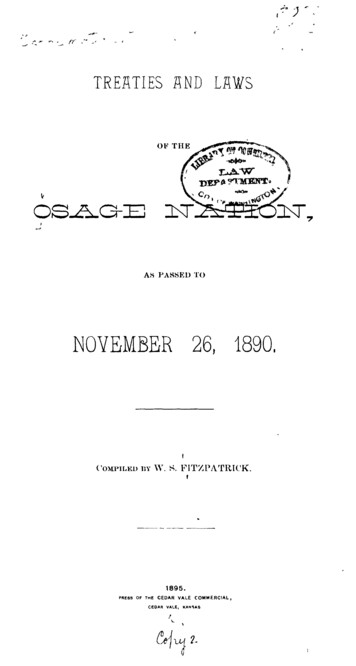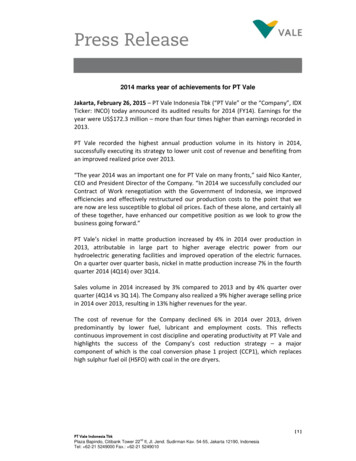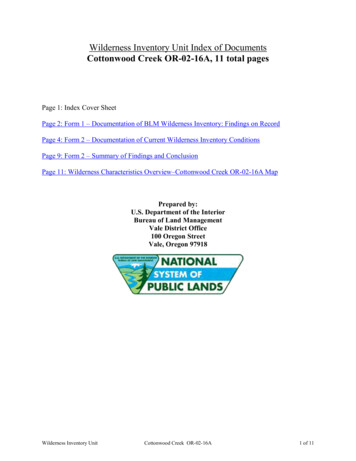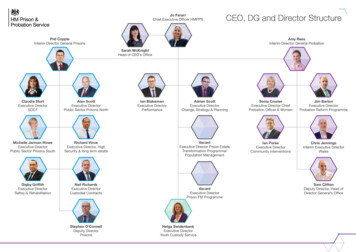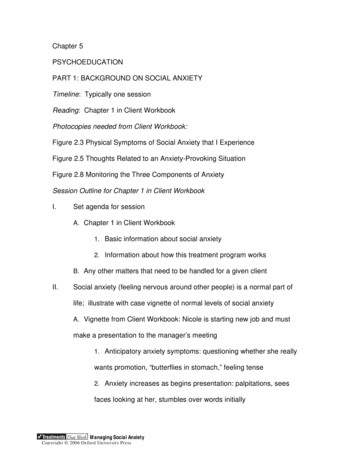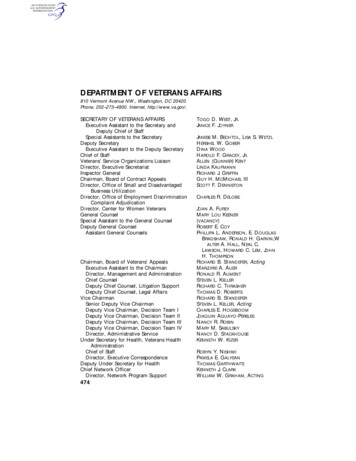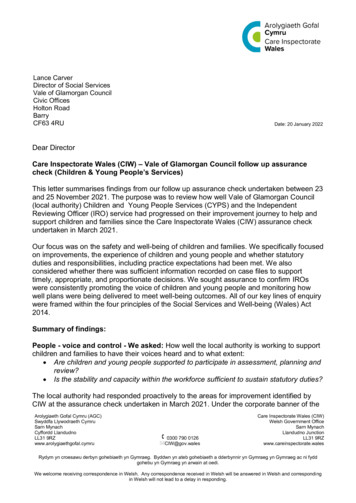
Transcription
Lance CarverDirector of Social ServicesVale of Glamorgan CouncilCivic OfficesHolton RoadBarryCF63 4RUDate: 20 January 2022Dear DirectorCare Inspectorate Wales (CIW) – Vale of Glamorgan Council follow up assurancecheck (Children & Young People’s Services)This letter summarises findings from our follow up assurance check undertaken between 23and 25 November 2021. The purpose was to review how well Vale of Glamorgan Council(local authority) Children and Young People Services (CYPS) and the IndependentReviewing Officer (IRO) service had progressed on their improvement journey to help andsupport children and families since the Care Inspectorate Wales (CIW) assurance checkundertaken in March 2021.Our focus was on the safety and well-being of children and families. We specifically focusedon improvements, the experience of children and young people and whether statutoryduties and responsibilities, including practice expectations had been met. We alsoconsidered whether there was sufficient information recorded on case files to supporttimely, appropriate, and proportionate decisions. We sought assurance to confirm IROswere consistently promoting the voice of children and young people and monitoring howwell plans were being delivered to meet well-being outcomes. All of our key lines of enquirywere framed within the four principles of the Social Services and Well-being (Wales) Act2014.Summary of findings:People - voice and control - We asked: How well the local authority is working to supportchildren and families to have their voices heard and to what extent: Are children and young people supported to participate in assessment, planning andreview? Is the stability and capacity within the workforce sufficient to sustain statutory duties?The local authority had responded proactively to the areas for improvement identified byCIW at the assurance check undertaken in March 2021. Under the corporate banner of theArolygiaeth Gofal Cymru (AGC)Swyddfa Llywodraeth CymruSarn MynachCyffordd LlandudnoLL31 9RZwww.arolygiaethgofal.cymru0300 790 0126CIW@gov.walesCare Inspectorate Wales (CIW)Welsh Government OfficeSarn MynachLlandudno JunctionLL31 9RZwww.careinspectorate.walesRydym yn croesawu derbyn gohebiaeth yn Gymraeg. Byddwn yn ateb gohebiaeth a dderbynnir yn Gymraeg yn Gymraeg ac ni fyddgohebu yn Gymraeg yn arwain at oedi.We welcome receiving correspondence in Welsh. Any correspondence received in Welsh will be answered in Welsh and correspondingin Welsh will not lead to a delay in responding.
Reshaping Services programme, an action plan had been developed which set out detailsof required improvements and timescales for delivery. The plan includes actions to promotethe voice of the child, implementation of a strength-based approach, as well as actions tostrengthen management oversight, collection and analysis of performance data and qualityassurance systems. Interviews with senior leaders confirmed political and corporate supportfor the programme and a shared understanding of the need for improvements.We recognise the local authority has invested in the development of a bespoke strengthbased approach to social work practice. The local authority see this as long-termtransformational change which builds on the skills and expertise of workers to help familiesachieve what matters to them. We were informed the implementation of the strength-basedapproach was a reflective and evolving plan to ensure the approach becomes embeddedas part of the day to day functioning of the local authority.We were told about strategic buy-in to the approach evidenced by senior managers andelected members’ participation in training and development workshops. The local authorityis aware of the importance of regular communication about the approach to colleagues andpartners, aiming for multi-disciplinary agreement and support for the practice framework.We found staff had been provided with “kitbags”1, and had been part of workshops on howto use the various tools within them. Responses to our staff survey included positivecomments from practitioners regarding the constructive use of the “kitbags” in their workwith children and families. Nevertheless, we did not find a cohesive framework to ensureconsistent strength-based practice in place. Further embedding of the approach should beimplemented at pace. Not only will such a culture change underpin practice improvementacross all services, specifically, it will provide a clearer framework and shared vocabularythat will enable professionals and families to more effectively identify and achieve positiveoutcomes for people.The IRO service are clearly committed to ensuring the voice of the child is heard as well asmore effective engagement with children looked after in reviews of their care and support.We were assured by IROs regarding their increased engagement with children and youngpeople prior to reviews when appropriate. Following the last assurance check the IROservice held development sessions to consider its own practice and areas for improvement,including the review of practice standards. We found children looked after were supportedto participate in their reviews. Their language, communication and level of emotional anddevelopmental maturity is explored. Alternative communication needs and observationswere noted on files reviewed. It is positive that IROs are seeking feedback from individualchildren and are looking to identify and learn from what has worked best for them.The local authority gives regard to the rights of children to be offered formal advocacy.Information provided by the local authority, confirmed children were offered access toadvocacy services and we saw evidence of this recorded on the files of care experiencedchildren. It was noted in a number of cases long-term foster carers acted as strongadvocates for children in their care.Inspectors were informed that due to COVID-19 restrictions some of the consultationactivities that would have routinely been undertaken with children and young people in1A toolkit to promote socially and emotionally literate relationships between children, professionals and carers2
respect of service changes had not been possible. However, the local authority hadresponded to messages from practice and feedback from children and young people inrelation to language used. For example they have replaced the term “contact” with “familytime” to reflect the terminology preference of children and young people. The local authorityare looking to build on positive learning. Alongside consultations with children, they areintending to introduce a virtual platform or App to gain children and young people’s views.In common with many other local authorities in Wales, the Vale of Glamorgan Council ismanaging significant workforce issues. Capacity planning is a key work stream within thedirectorate’s Reshaping Services programme, recognising the importance of stability andsufficiency of the workforce. We found there was corporate support committed to increasingworkforce capacity, evidenced by a sustained and imaginative approach to recruitment andretention alongside more investment in a “grow your own” approach to professionallydeveloping current staff.The local authority has identified the recruitment and retention of staff to the Intake andFamily Support Team (IFST) and the Care Planning and Proceedings (CPP) Team asbusiness critical areas. As a response, enhanced salaries have been introduced to attractrecruitment to these teams. The local authority are aware of the implications for childrenand their families of changes within the workforce created by use of agency staff. It ispositive that CYPS are developing direct links with recruitment agencies and aremaintaining data about use of agency staff to ensure a clear line of sight on most effectivedeployment.Discussions with managers and reviews of case files evidenced stability within the ChildrenLooked After Team and 15 Team. The social workers in these teams knew the childrenthey work with well and understood their circumstances. We found children and youngpeople looked after had benefitted from the opportunity to develop relationships withpractitioners.We frequently heard from managers about the highly committed workforce. The majority ofstaff who responded to our survey and the IROs spoken with confirmed they felt supportedby their colleagues and managers. Just over half of the survey respondents said theircaseloads were manageable, although many referenced “fatigue” and “burn-out”. It is to thecredit of senior managers and the workforce that despite the challenges bought about bythe pandemic, sickness/absence levels had remained static and staff morale generally wasgood. Promoting and maintaining the well-being of the workforce is clearly a priority formanagers and senior leaders.Well-being - We asked: – How well is the local authority meeting its statutory duty topromote children’s well-being; ensuring protection of children from harm, neglect and abuseand supporting families to achieve positive outcomes that matter to them and to whatextent: Assessments and reviews are undertaken in a timely manner in accordance withstatutory timescales? Recording quality of assessments and care plans reflect the positive work beingundertaken with children and families?Data submitted by the local authority confirms significant improvements are required toensure assessments and reviews are undertaken within statutory timescales.3
Further work is required to ensure statutory visits are undertaken in a timely manner.Although we were assured from case reviews and discussions with managers and IROschildren and families were seen (during COVID restrictions) and continue to be seen, many“visits” did not meet the required practice standard of a “statutory visit” and have thereforenot been recorded as such. We recognise, as do the local authority, the potential impact onsafety of this compromise and as such the local authority should achieve swift improvementin this area.The local authority were taking action to strengthen their performance data and qualityassurance systems. Work included streamlining processes within the electronic recordmanagement system Welsh Community Care Information System (WCCIS) anddevelopment of practice standards aimed at achieving more consistent performance datacollection. The local authority is working hard to cleanse its performance data to strengthenmanagers’ and workers’ understanding of their compliance with regulatory requirements butalso so that the local authority can respond more effectively to any short falls. Agreementhas been given to provide CYPS with dedicated capacity to undertake this work.The local authority had introduced appropriate measures (RAG system) to addresschallenges experienced by a sustained increase in referrals and workforce pressuresresulting in delays in allocating assessments/re-assessments. These arrangements ensurethe prioritisation of allocation of work, with consideration given to level of risk, need andwaiting time. When cases are not allocated referrers/partner agencies are advised in orderto ensure a partnership approach to promoting the safety and well-being of children andfamilies concerned. Discussions with managers demonstrated they were aware of theimportance of recording referral outcome decisions and management oversight. We sawevidence of this on case files reviewed.We found the quality of assessments and care plans was inconsistent with some requiringsignificant improvement. The local authority had worked hard to promote a stronger voicefor children and young people in their care and support plans and the review process. Mostof the assessments and plans we saw were not outcome focused nor was it evident thatchildren and families had been involved in co-production. The local authority must progressthe development of quality assurance systems identified as part of the Reshaping Servicesprogramme to ensure more systematic monitoring of the quality of assessments and plansaimed at driving quality improvement.In one case reviewed, records failed to reflect checks being made with the school further toa safeguarding concern being raised. Discussion with a manger subsequently evidencedthe concerns were followed up with the family. Inspectors acknowledge work in progress,however the local authority should ensure greater specificity of records to ensurecompliance with relevant codes of practice and legal requirements and to evidencemanagement of risks to children’s safety.The IROs presented as confident in their role and in their ability to challenge and escalatecases as required. The IRO service plan to attend social work team meetings and areworking with statutory partners to ensure there is a shared understanding of their role andto reinforce the child’s ownership of their review. IROs were respectful of the current case4
pressures in the social work teams and had been proactive in working with teams toreinforce the importance of them being kept well informed of any significant issues.A business case to increase IRO capacity was being considered by the local authorityreflecting the redefined scope of these workers’ responsibilities to accommodate anenhanced quality assurance role. Changes to these arrangements once implementedacross all teams have the potential to support required improvements to practice.An IRO mid-point check including discussions with the social worker, placement providerand direct contact with the child/young person had been introduced. Evidence of this wasseen on the files reviewed. IROs indicated this had increased their workload but the newarrangements were valued and the midpoint check was constructive in ensuring progress,identifying potential drift or barriers. The local authority should ensure these activities areconsistently captured within records.In discussion with managers and IROs, whilst they were confident that practice is childfocused they recognised the need to refresh arrangements to ensure that work undertakento capture the voice and experiences of children and families is more explicitly andconsistently reflected in records. Directly capturing the child’s own words might have amore powerful resonance for some children and young people.Prevention - We asked: How well is the local authority promoting prevention and reducingneed for increased or formal support from statutory agencies and to what extent: Can children and families receive timely proportionate preventive interventions thatimprove their situation? Can children and families access care & support in a timely manner?We found evidence of the provision of early intervention and prevention services to assist insupporting some children and families. We saw good use of signposting to Families FirstAdvice Line (FFAL), evidence of Families Achieving Change Together (FACT) teamsupporting children and families not eligible for care and support and/or being “steppeddown” from care and support. We heard an increasing volume of families with needs noteligible for care and support were being supported by a team around the family (TAF) andthat capacity in FFAL had been strengthened in recognition of increased demand.We were assured that information and communication exchange between early help andstatutory services was effective at both strategic and operational levels. It is positive thatthe management structure in CYPS facilitates a direct line of sight of the interface betweenservices providing a “safety net” for some families where more intensive work became anecessity. Early help practitioners and Children’s Services statutory teams have access toconsultancy from a variety of specialists in particular substance misuse and primary mentalhealth workers and the police community support officer (PCSO).Data provided by the local authority indicates there had been a significant increase ofdemand for services. There had also been an increase in the numbers of children lookedafter. Despite best efforts of the local authority it is apparent there remains insufficientcapacity currently within CYPS workforce to meet these increasing demands. This meansthat children and families cannot always access care and support in a timely manner.Evidence from our review of case files supports this finding.5
In recognition of and in response to the significant increases in demand experienced at the‘front door’ and the need to ensure delivery of a safe services, the local authority initiated awork programme dedicated to the improvement of processes within the IFST. Additionalpractitioner manager and social worker posts had been approved. Social care officers werealso being recruited to support social workers, and wider divisional and directorateresources had been used flexibly to alleviate pressures. At the time of our follow upassurance check it was too soon to comment on the impact of these changes.The case files of care experienced children we reviewed clearly demonstrated a positivefocus on promoting permanence, including within the family. We found the importance offamily time with birth family was well understood by social workers. Where permanencewas achieved through long term fostering the care planning arrangements supportedchildren and young people to develop a clear sense of identity. We saw evidence in careand support plans of direct work to help children understand their situations. For the mostcomplex case-work, staff were supported through consultation at the psychology panel andchildren and families by the ENFYS team (a psychological service seen as having apositive impact on the care and well-being of children and families accessing this service).Partnership and Integration - We asked: How well is the local authority able to assurethemselves opportunities for partnership working ensure integrated service delivery thatdrives sustainability and to what extent: Do partners work collaboratively with the local authority to support the safety andwell-being of children and familiesThe impact of the pandemic has created disruption to well-established regional and localpartnerships arrangements. However, we heard regional safeguarding and partnershipboards have now resumed and joint management executive meetings have begun toreprioritise children’s services. More recently joint planning across the region, including theHealth Board, is developing a response to meet the accommodation needs of young peoplewith mental health needs who are being discharged from hospital, and work was beingundertaken with police colleagues to better align thresholds with a view to achieving moreconsistent practice. Innovatively an App is being developed to support police officersdecision making regarding when to refer to children’s services or to FFAL.At best, evidence seen in case files supports constructive partnership working in the contextof safeguarding. We saw evidence of partners submitting safeguarding reports andcontributing to strategy discussions/meetings. At worst, one case we reviewed evidenced adelay in undertaking a joint visit with a partner agency; records were not maintained of theattempts made to arrange the visit nor of the reasons for the delay.The majority of staff who responded to our survey rated partnership working to supportchildren and families to have their voices heard and to receive effective, proportionate andtimely interventions that improve their situations as good or very good.We saw strong partnership working between CYPS and Resource Management &Safeguarding (RMS) divisions. Senior managers from these divisions demonstrated ashared commitment to ensuring the safety and well-being and children and their families.6
Conclusion and Next StepsThe local authority has worked hard to respond to the findings from the last CIW assurancecheck. Improvements are required to further promote children and families to have theirvoices heard; to ensure the quality of assessments and reviews are improved and thatthese are produced in a timely manner in accordance with statutory timescales.Work has commenced with regards to strengthening the standard of recording but this workneeds to embed to ensure the standard of recording is consistently good. Increased pace ofchange in respect of implementation of a consistent strength-based approach and moresystematic use of both quantitative and qualitative performance information will assist inachieving the improvements required.During our next performance review period (2022 – 23) CIW will continue to monitorprogress alongside the local authority through routine performance review activities.Progress will be regularly reviewed internally through CIW local authority risk basedapproach to inspection planning.Please see our Privacy Notice at rmationYours sincerely,Lou Bushell-BauersHead of Local Authority InspectionCare Inspectorate Wales7
Appendix 1Methodology we reviewed documentation supplied in advance of our inspectionwe reviewed 14 case files (nine recent referrals/assessments and five childrenlooked after post first six month review)we held collaborative conversations with operational managers about the case fileswe reviewedwe issued a staff survey to CYPS and IROswe held three workshops which included heads of service (CYPS and RMS) andoperational managers, focussing on: children’s voices, interventions and workforcewe held a focus group with IROs their manager and the manager of CPCP teamwe spoke individually with the statutory director of social services and cabinetmember for social care and heathNOTE: Given the format of this inspection, it has not been possible to triangulate findingswith front line practitioners, partners or people who use services.8
based approach to social work practice. The local authority see this as long-term transformational change which builds on the skills and expertise of workers to help families achieve what matters to them. We were informed the implementation of the strength-based approach was a reflective and evolving plan to ensure the approach becomes embedded

